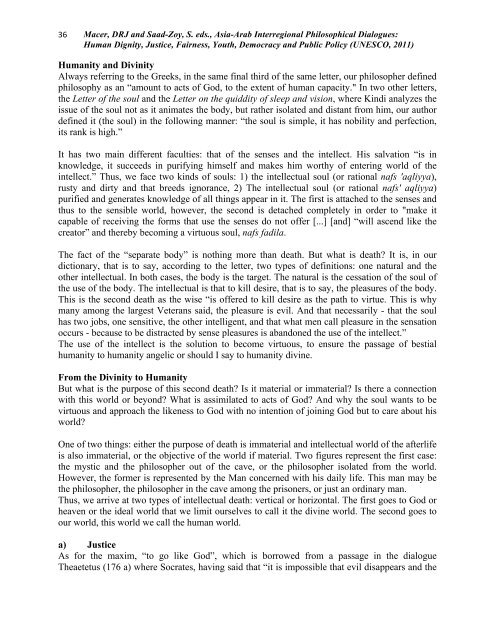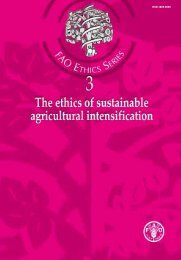Human Dignity, Justice, Fairness, Youth - Eubios Ethics Institute
Human Dignity, Justice, Fairness, Youth - Eubios Ethics Institute
Human Dignity, Justice, Fairness, Youth - Eubios Ethics Institute
Create successful ePaper yourself
Turn your PDF publications into a flip-book with our unique Google optimized e-Paper software.
36 <br />
Macer, DRJ and Saad-Zoy, S. eds., Asia-Arab Interregional Philosophical Dialogues:<br />
<strong>Human</strong> <strong>Dignity</strong>, <strong>Justice</strong>, <strong>Fairness</strong>, <strong>Youth</strong>, Democracy and Public Policy (UNESCO, 2011)<br />
<strong>Human</strong>ity and Divinity<br />
Always referring to the Greeks, in the same final third of the same letter, our philosopher defined<br />
philosophy as an “amount to acts of God, to the extent of human capacity." In two other letters,<br />
the Letter of the soul and the Letter on the quiddity of sleep and vision, where Kindi analyzes the<br />
issue of the soul not as it animates the body, but rather isolated and distant from him, our author<br />
defined it (the soul) in the following manner: “the soul is simple, it has nobility and perfection,<br />
its rank is high.”<br />
It has two main different faculties: that of the senses and the intellect. His salvation “is in<br />
knowledge, it succeeds in purifying himself and makes him worthy of entering world of the<br />
intellect.” Thus, we face two kinds of souls: 1) the intellectual soul (or rational nafs 'aqliyya),<br />
rusty and dirty and that breeds ignorance, 2) The intellectual soul (or rational nafs' aqliyya)<br />
purified and generates knowledge of all things appear in it. The first is attached to the senses and<br />
thus to the sensible world, however, the second is detached completely in order to "make it<br />
capable of receiving the forms that use the senses do not offer [...] [and] “will ascend like the<br />
creator” and thereby becoming a virtuous soul, nafs fadila.<br />
The fact of the “separate body” is nothing more than death. But what is death? It is, in our<br />
dictionary, that is to say, according to the letter, two types of definitions: one natural and the<br />
other intellectual. In both cases, the body is the target. The natural is the cessation of the soul of<br />
the use of the body. The intellectual is that to kill desire, that is to say, the pleasures of the body.<br />
This is the second death as the wise “is offered to kill desire as the path to virtue. This is why<br />
many among the largest Veterans said, the pleasure is evil. And that necessarily - that the soul<br />
has two jobs, one sensitive, the other intelligent, and that what men call pleasure in the sensation<br />
occurs - because to be distracted by sense pleasures is abandoned the use of the intellect.”<br />
The use of the intellect is the solution to become virtuous, to ensure the passage of bestial<br />
humanity to humanity angelic or should I say to humanity divine.<br />
From the Divinity to <strong>Human</strong>ity<br />
But what is the purpose of this second death? Is it material or immaterial? Is there a connection<br />
with this world or beyond? What is assimilated to acts of God? And why the soul wants to be<br />
virtuous and approach the likeness to God with no intention of joining God but to care about his<br />
world?<br />
One of two things: either the purpose of death is immaterial and intellectual world of the afterlife<br />
is also immaterial, or the objective of the world if material. Two figures represent the first case:<br />
the mystic and the philosopher out of the cave, or the philosopher isolated from the world.<br />
However, the former is represented by the Man concerned with his daily life. This man may be<br />
the philosopher, the philosopher in the cave among the prisoners, or just an ordinary man.<br />
Thus, we arrive at two types of intellectual death: vertical or horizontal. The first goes to God or<br />
heaven or the ideal world that we limit ourselves to call it the divine world. The second goes to<br />
our world, this world we call the human world.<br />
a) <strong>Justice</strong><br />
As for the maxim, “to go like God”, which is borrowed from a passage in the dialogue<br />
Theaetetus (176 a) where Socrates, having said that “it is impossible that evil disappears and the

















